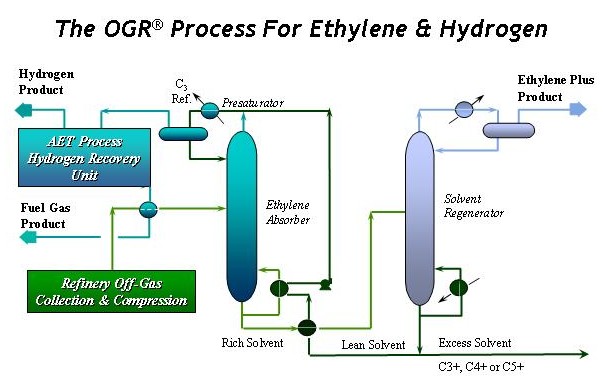Technology
Refinery Gas -
Off Gas Recovery
The patented Off-Gas Recovery (OGR)
Process uses conventional unit operations for non-cryogenically absorbing
ethylene and heavier hydrocarbons from FCCU and delayed coker off-gases
that are usually burned in refineries. After treating, the gases
are counter-currently contacted with chilled, pre-saturated lean solvent
in an ethylene absorber which is reboiled at the bottom. The
demethanized rich solvent is fractionated in the solvent regenerator to
produce an overhead ethylene plus product and a bottoms lean solvent
stream for returning to the top of the ethylene absorber. The
solvent is simply the heavier components of the feed gas.
Click here for larger view of drawing.

The ethylene plus product may be
further fractionated to produce ethylene, ethane and propylene plus
products as desired for specific applications. If only C2 product
recovery is required, the solvent regenerator can produce a mixed C2
overhead stream and a C3+ bottoms solvent stream, increasing process
efficiency and reducing fractionation requirements. When desired,
the contained hydrogen in the overhead stream from the ethylene absorber
may be recovered in an AET Hydrogen Recovery unit. For most
applications there are no solvent make-up requirements. Recovery of
C3 plus components from refinery off gases or fuel systems uses the same
technology as LPG recovery from natural gas or ethylene recovery from
refinery gases. The performance difference is in the feed gas.
FCCU off-gas is typically more suitable for recovery of the high value
ethylene/ethane mix. Coker off-gas will see higher profitability
from C3 plus recovery. Compared to natural gas, the coker or fuel
gas systems are much richer in C3 plus, increasing profitability and
giving absorption technology a decided edge versus use of cryogenic
technologies. In C3 plus operation, the AET technology would
operate with a C5+ regenerator tower bottoms product (and solvent
composition) and a C3-C4 regenerator overhead product.
ADVANCED
EXTRACTION
TECHNOLOGIES,
INC.
![]()